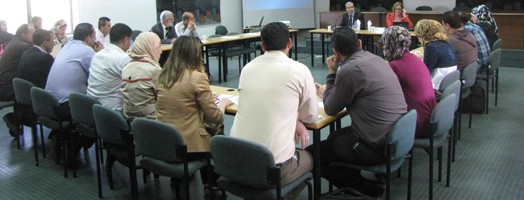The Legal Requirements for E-Government in Palestine: Lessons from Estonia
of the Chair of Law and Technology at Tallinn Law School, Tallinn University of Technology. In addition to representatives of Palestinian line ministries and non-ministerial government departments, the legal encounter brought together a select number of interested legal practitioners and IT professionals.
Having welcomed the speaker and audience, Dr. Firas Milhem, Professor of Constitutional Law at Birzeit University, stressed the need to introduce and discuss e-government issues in the Palestinian context. Highlighting the growing attention to e-government functions, Dr. Milhem noted that an e-governance initiative has recently been launched by Birzeit University, High Judicial Council, and several line ministries, including the ministries of telecommunications and interior.
In her opening remarks, Professor Nyman-Metcalf explained e-government concept and significance. Though it has not so far been identified by relevant international conventions, e-government can be defined as a tool of digital interactions between citizens and public administration as well as between public authorities themselves. E-government strategies can be employed for delivering government information and services to the citizens. E-government allows an effective and efficient interaction between a government and citizens and also between the government and local governments or agencies. Introducing the Estonian experience as a model, Professor Nyman-Metcalf cited electronic identity cards (e-IDs) used by Estonia citizens. E-IDs are used in several activities, including electronic tax returns. E-government benefits also include fast and safe government transactions.
Noting safe e-transactions, Professor Nyman-Metcalf stressed that laws should be in place to allow a secured use of e-government delivery models. E-government systems should be secure and capable of detecting errors. Information leakage will be monitored by screening committees, who can track down file paths. Unlike paper-based transactions, paperless offices ensure file security. E-government strategies further allow a more enhanced capacity to curb cyber corruption.
According to Professor Nyman-Metcalf, several countries have adopted and codified e-signature technology. Special norms are now in place, explaining relevant terminology, moral obligations and controls. The Government of Estonia delivers a range of e-services to both the common citizens and government bodies, including in the housing, culture and education sectors. E-service delivery further assists official decision making processes. E-democracy also allows an increased online public participation in national elections, through both the internet and the mobile telephone.
In the ensuing discussion, participants highlighted that citizens need to use e-IDs as they save time and effort. To also introduce relevant uses, a campaign should be launched to raise public awareness about convenient and cost-effective e-government delivery models.
Organised in partnership with Konrad Adenauer Stiftung – Ramallah Office, representatives of relevant government departments and interested persons took part in the legal encounter.











